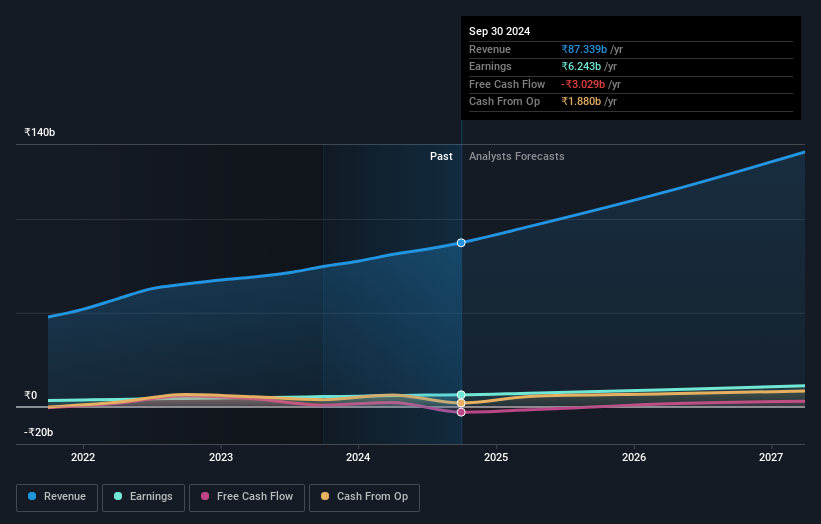KEI Industries Limited (NSE:KEI) Analysts Are Pretty Bullish On The Stock After Recent Results
Shareholders might have noticed that KEI Industries Limited (NSE:KEI) filed its quarterly result this time last week. The early response was not positive, with shares down 8.5% to ₹4,145 in the past week. It was a workmanlike result, with revenues of ₹23b coming in 2.5% ahead of expectations, and statutory earnings per share of ₹64.25, in line with analyst appraisals. Following the result, the analysts have updated their earnings model, and it would be good to know whether they think there's been a strong change in the company's prospects, or if it's business as usual. So we collected the latest post-earnings statutory consensus estimates to see what could be in store for next year.
Check out our latest analysis for KEI Industries

Taking into account the latest results, the current consensus from KEI Industries' eleven analysts is for revenues of ₹96.0b in 2025. This would reflect a solid 10% increase on its revenue over the past 12 months. Statutory earnings per share are predicted to expand 15% to ₹79.22. Before this earnings report, the analysts had been forecasting revenues of ₹94.7b and earnings per share (EPS) of ₹80.47 in 2025. The consensus analysts don't seem to have seen anything in these results that would have changed their view on the business, given there's been no major change to their estimates.
The consensus price target rose 5.3% to ₹4,950despite there being no meaningful change to earnings estimates. It could be that the analystsare reflecting the predictability of KEI Industries' earnings by assigning a price premium. Fixating on a single price target can be unwise though, since the consensus target is effectively the average of analyst price targets. As a result, some investors like to look at the range of estimates to see if there are any diverging opinions on the company's valuation. The most optimistic KEI Industries analyst has a price target of ₹6,151 per share, while the most pessimistic values it at ₹4,131. These price targets show that analysts do have some differing views on the business, but the estimates do not vary enough to suggest to us that some are betting on wild success or utter failure.
These estimates are interesting, but it can be useful to paint some more broad strokes when seeing how forecasts compare, both to the KEI Industries' past performance and to peers in the same industry. The analysts are definitely expecting KEI Industries' growth to accelerate, with the forecast 21% annualised growth to the end of 2025 ranking favourably alongside historical growth of 15% per annum over the past five years. Other similar companies in the industry (with analyst coverage) are also forecast to grow their revenue at 21% per year. KEI Industries is expected to grow at about the same rate as its industry, so it's not clear that we can draw any conclusions from its growth relative to competitors.
The Bottom Line
The most important thing to take away is that there's been no major change in sentiment, with the analysts reconfirming that the business is performing in line with their previous earnings per share estimates. Happily, there were no real changes to revenue forecasts, with the business still expected to grow in line with the overall industry. There was also a nice increase in the price target, with the analysts clearly feeling that the intrinsic value of the business is improving.
With that in mind, we wouldn't be too quick to come to a conclusion on KEI Industries. Long-term earnings power is much more important than next year's profits. We have estimates - from multiple KEI Industries analysts - going out to 2027, and you can see them free on our platform here.
It is also worth noting that we have found 1 warning sign for KEI Industries that you need to take into consideration.
Have feedback on this article? Concerned about the content? Get in touch with us directly. Alternatively, email editorial-team (at) simplywallst.com.
This article by Simply Wall St is general in nature. We provide commentary based on historical data and analyst forecasts only using an unbiased methodology and our articles are not intended to be financial advice. It does not constitute a recommendation to buy or sell any stock, and does not take account of your objectives, or your financial situation. We aim to bring you long-term focused analysis driven by fundamental data. Note that our analysis may not factor in the latest price-sensitive company announcements or qualitative material. Simply Wall St has no position in any stocks mentioned.
 Index Options
Index Options CME Group
CME Group Nasdaq
Nasdaq Cboe
Cboe TradingView
TradingView Wall Street Journal
Wall Street Journal